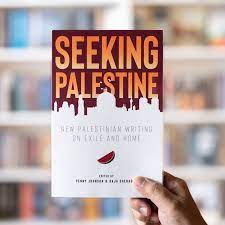“Susan Abulhawa Seeking Palestine: New Palestinian Writing on Exile and Home” Audiobook Review

You may not be familiar with the name, Susan Abulhawa. However, once you delve into her literary works, she becomes an unforgettable figure. Abulhawa is a Palestinian-American novelist, poet, and political activist. Born to refugee parents, she spent her early years in Kuwait and Jerusalem before moving to the United States. Her experiences of displacement and migration have deeply influenced her writing.
Her debut novel, “Mornings in Jenin,” is a heart-wrenching exploration of the Israeli-Palestinian conflict, viewed through the lens of a single Palestinian family. It was translated into 30 languages and became an international bestseller. Her other notable works include “The Blue Between Sky and Water” and the poetry collection “My Voice Sought The Wind.” In her works, Abulhawa weaves complex narratives around the themes of exile, home, identity, and resistance.
The recurring theme of exile and home in Palestinian literature
In Palestinian literature, the theme of exile and home is a recurring motif, reflecting the historical and ongoing displacement of the Palestinian people. The very name “Palestine” conjures images of loss, longing, and a profound sense of exile. Yet, it is also a place of home, identity, and resistance.
Palestinian writers often employ the trope of exile to depict their collective historical experience. Their works resonate with the pain of displacement, the struggle for survival, and the longing for return. At the same time, they also evoke the concept of home – not just as a physical place, but as a deeply emotional and psychological space.
Susan Abulhawa’s interpretation of exile
In Abulhawa’s works, exile is not merely a geographical displacement. It is a state of being, a painful consciousness that permeates the lives of her characters. Abulhawa’s interpretation of exile extends beyond the physical separation from one’s homeland. It encompasses the loss of identity, the rupture of familial ties, and the erasure of cultural heritage.
In “Mornings in Jenin,” the protagonist Amal experiences exile in multiple ways. She is forced to leave her home in Palestine, lives in a refugee camp in Lebanon, and eventually moves to America. Each displacement deepens her sense of alienation, yet strengthens her resolve to return home.
Susan Abulhawa’s representation of home
In sharp contrast to the stark portrayal of exile, Abulhawa’s representation of home is imbued with warmth, love, and resilience. Home is not just a geographical location; it is a repository of memories, a source of identity, and a symbol of resistance.
In “The Blue Between Sky and Water,” home is an ancestral village in Gaza, remembered and yearned for by the generations of women in the Baraka family. Despite living in exile, they carry the memory of their home in their hearts, passing it down like a precious heirloom.
Analysis of exile and home in Susan Abulhawa’s novels
A closer analysis of Abulhawa’s novels reveals the intricate interplay between the themes of exile and home. Her characters are invariably caught in the tussle between their longing for home and the harsh realities of exile. They grapple with loss, trauma, and identity crises, yet their spirit remains unbroken. Their resilience in the face of adversity is a testament to their deep-rooted connection to their homeland.
In “Mornings in Jenin,” the protagonist Amal’s journey is emblematic of the Palestinian diaspora. Her life is marked by loss and displacement, yet she clings to her Palestinian identity and dreams of returning home.
The role of historical events in shaping the dynamics of exile and home in her works
Abulhawa’s works are deeply rooted in the historical realities of Palestine. The Nakba (or catastrophe) of 1948, the Six-Day War of 1967, the Lebanon War of 1982 – these key historical events shape the dynamics of exile and home in her novels.
The characters in “Mornings in Jenin” and “The Blue Between Sky and Water” bear the scars of these historical events. They are victims of political upheavals, yet they are also the custodians of their history. Their narratives serve as a poignant reminder of their people’s struggle and resilience.
Susan Abulhawa’s unique contribution to Palestinian literature
Abulhawa’s contribution to Palestinian literature is unique in many ways. She brings to the fore the voices of women, children, and refugees – often marginalized in the political discourse on the Israeli-Palestinian conflict. Her narratives are deeply personal, yet they resonate with the collective experience of the Palestinian people.
Moreover, Abulhawa’s works have played a significant role in globalizing Palestinian literature. Her novels have been translated into multiple languages and have reached a wide international audience, raising awareness about the Palestinian cause.
Critical reactions to Susan Abulhawa’s vision of exile and home
Abulhawa’s vision of exile and home has elicited diverse critical reactions. While some critics have lauded her for her emotive storytelling and vivid characterizations, others have criticized her for her overt political stance.
Regardless of the critical discourse, one cannot deny the profound impact of Abulhawa’s works. They have touched the hearts of readers across the globe and have sparked important conversations about the Palestinian struggle for justice and self-determination.
Susan Abulhawa’s influence on contemporary Palestinian literature
Abulhawa has had a significant influence on contemporary Palestinian literature. Her works have opened up new narrative spaces and have inspired a new generation of Palestinian writers.
Moreover, her success as a Palestinian-American novelist has broken barriers and challenged stereotypes. She has paved the way for other Palestinian writers to find their voices and tell their stories on a global platform.
Conclusion: The enduring relevance of exile and home in Palestinian literature
In conclusion, the themes of exile and home continue to hold enduring relevance in Palestinian literature. They reflect the historical trauma and the ongoing struggle of the Palestinian people. And in the hands of writers like Susan Abulhawa, these themes become powerful tools for resistance, resilience, and hope.
